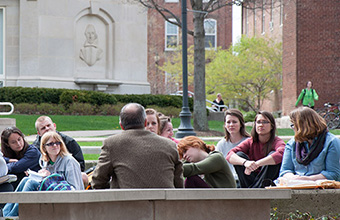College of Arts and Sciences Newsroom

Teaching Ethics
Insider trading, computer hacking, conflicts of interest - nearly every day, the news media brings us more stories about ethical lapses in business and government.
Starting this fall, a number of University of Dayton faculty are incorporating ethics components into their courses to better prepare students for morally complex challenges they likely will face in their professional and personal lives.
Nine faculty and staff members were awarded grants to develop ethics-related teaching "modules" - self-contained content units to be covered in one or more classroom sessions - for their existing courses. The faculty represent a range of academic disciplines that include English, philosophy, psychology, communication, computer science, and management and marketing.
The Ethics Leadership Grant initiative is made possible by a gift to the College of Arts and Sciences from a University alumnus and his wife, who want to expose students to ethical thinking and professional codes of conduct. The donors wish to remain anonymous.
"The outcome they want is that, as students enter their careers, they have a toolbox for navigating inevitable ethical conflicts that they'll face," said Danielle Poe, professor of philosophy and College associate dean for curriculum and academic outcomes.
The College provides students from across the University with a well-rounded liberal arts education to prepare them to become servant leaders whose lives and careers contribute to the common good.
"By providing faculty with the support to bring ethical content into their areas of expertise, we are helping realize that mission for students and the University," Poe said.
During the spring 2016 semester, Poe facilitated a series of six faculty seminars about the role of ethics within various academic disciplines. Faculty who attended two or more seminars could then apply for grants to support development of ethics modules over the summer months. Now, the ethics components will be implemented in courses being taught during the 2016-17 academic year.
Ethics is a branch of philosophy that involves rules of behavior based on ideas about what is morally right or wrong. For a journalist, unethical behavior could involve plagiarizing another writer’s work. In computer science, it might mean hacking into a database to steal a competitor’s intellectual property.
In the business world, breaches of public and private trust can cost billions of dollars and millions of jobs, as evidenced in recent years by the high-profile fraud cases of late financier Bernie Madoff and former Enron CEO Jeff Skilling.
The 2016 presidential election has been rife with accusations of unethical behavior, from "pay-to-play" politics to a plagiarized convention speech.
The University wants to help students avoid ethical issues by supplementing their professional training with exposure to ethical teaching, said Bill Marvin, a department of philosophy lecturer who teaches business, information and engineering ethics.
"Students here are getting a lot more exposure to ethics than I think they do at other colleges," Marvin said. "This is really consistent with the mission of the University - the social justice and sustainability missions are ethical issues."
Marvin was awarded a grant and also serves as ethics consultant for his fellow recipients. He developed ethics-related resources that include case studies, supplemental readings, professional codes of ethics, and videos about major ethical theories. The materials are available to faculty and students on the University’s online learning management system.
Poe said integrating ethics content into existing classes helps students realize how integral the topic is to their future vocations, as opposed to creating a stand-alone ethics experience that might seem disconnected from their regular coursework.
For example, Associate Professor Raghava Gowda’s computer science students will be required to research ethical issues related to their capstone projects and then include that information in their class presentations. Assistant Professor Annette Taylor’s journalism students will learn about the ethics and standards that are essential for their professional credibility. Assistant Professor Julie Walsh-Messinger’s psychology students will learn how to safeguard the welfare and rights of their future clients by adhering to a professional code of conduct.
"If we keep using common language and coming back to these ideas, then students - as they enter their careers and face ethical situations beyond the University - will be able to draw upon these ethical theories and projects they did as undergraduates, so that the learning transfers into job skills and life skills," Poe said.
The College plans to continue the grant program beyond the current academic year to provide additional University faculty with opportunities for their students to develop and practice skills in negotiating ethical challenges, she said.
- Dave Larsen, communication coordinator, College of Arts and Sciences
2016 Ethics Leadership Grant Recipients
| Faculty or Staff | Title | Department |
| Phyllis Bergiel | Coordinator for academic initiatives | College of Arts and Sciences |
| Neil Florek | Lecturer | Philosophy |
| Raghava Gowda | Associate professor | Computer science |
| Bill Marvin | Lecturer | Philosophy |
| Bill Meek | Associate professor | Management and marketing |
| Arnecia Patterson | Lecturer | English |
| Tereza Szeghi | Associate professor | English |
| Annette Taylor | Assistant professor | Communication |
| Julie Walsh-Messinger | Assistant professor | Psychology |
